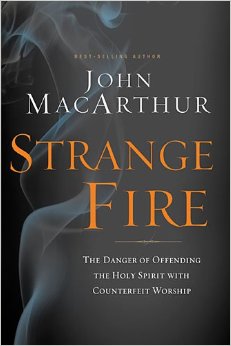John MacArthur’s Strange Fire, A Brief Biblical Response by Jon Ruthven
 John MacArthur, Strange Fire: The Danger of Offending the Holy Spirit with Counterfeit Worship (Nashville, TN: Nelson Books, 2013), 333 pages, ISBN 9781400206414.
John MacArthur, Strange Fire: The Danger of Offending the Holy Spirit with Counterfeit Worship (Nashville, TN: Nelson Books, 2013), 333 pages, ISBN 9781400206414.
As we shall see, John MacArthur’s abhorrence of “further revelation” via prophecy and related spiritual gifts derives, not from scripture, but from the frustration of Calvinists under Oliver Cromwell (1599-1658) of watching so many of their members defect to the Quakers, the crazy charismatics of the time. People were falling down, making a lot of noise and encountering Jesus in visions, prophecies, and healings. Sound familiar? Calvinist scholastics responded to this outrage with the Westminster Confession of Faith (WCF)—often now regarded as the gold standard of Calvinist theology.
Despite the charismatic experiences of even some of the authors of the WCF, and especially their founder, John Knox, whose charismatic experiences were abundant and powerful, the dogmatists managed to ram through this narrow, unpopular paragraph in 1646, which, was to be imposed by threat of death on the British Isles—including Catholic Ireland. This curious history is thoroughly documented in a revised PhD dissertation by Garnet H Milne, The Westminster Confession of Faith and the Cessation of Special Revelation (Milton Keynes, UK: Paternoster, 2007). See review in Pneuma 31:2 (2009), 318.
1. … It pleased the Lord, at sundry times, and in divers manners, to reveal Himself, and to declare that His will unto His Church [Heb 1:1] and afterwards for the better preserving and propagating of the truth, and for the more sure establishment and comfort of the Church against the corruption of the flesh, and the malice of Satan and of the world, to commit the same wholly unto writing [Prov22:19-21; Lk1:3; Rom15:4; Mt 4:4]; which makes the Holy Scripture to be most necessary [2Tm 3:15; 2Pt 1:19]; those former ways of God’s revealing His will unto His people [miracles, prophecy] being now ceased [Heb1:1-2]. [Emphasis mine]
When the WCF was presented to Parliament for approval, the suspicious representatives bounced the document back, quite reasonably fearful that this document was asserting itself as a substitute for scripture itself. They demanded that the writers support every claim in the Confession with a clear grounding in the Bible. The writers grudgingly complied, though their exegetical skills fell far short of supporting their elaborate theologizing. If you can make sense of how these scripture verses they added [in brackets] support the dogmatic claims in this paragraph, then you are a far more insightful exegete than I.
Category: Pneuma Review, Spirit, Winter 2014


